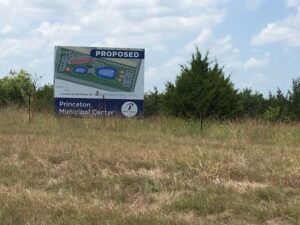
Blogger’s Note: This blog item was published originally on KETR-FM’s website.
Princeton City Hall is a non-descript structure on U.S. 380. The City Council meets there. The city administrative offices are located inside the structure the city leases from the building owner.
It comprises about 6,000 square feet. The Princeton Police Department works out of another structure, as does the Princeton Fire Department.
Well, if City Manager Derek Borg and the City Council have their way, they intend to break ground in about a year on a shiny new municipal complex about a mile east of the current site.
First, though, the city needs a “concept” of what the new complex will look like.
Borg is awaiting the concept from the architectural firm the city has hired, GFF Architects, based in Dallas. He’ll present it to the council, which then would approve it. Then the city hopes to break ground on a massive new public/private endeavor on the north side of U.S. 380.
There will be restaurants and other commercial enterprises, plenty of greenspace, two lakes, natural vegetation, wetlands, a bridge that goes over the wetlands to protect their integrity.
“We’re in the very early stages of the concept,” Borg said. “The next thing will be to look at the cost and how it can be funded.”
OK, so what’s the city’s role here?
Borg said Princeton has outgrown its tiny City Hall. It needs a lot more space. The city intends to bring police and fire administrations under one roof along with other departments. How much space would the new City Hall complex entail? Borg estimates 40,000 to 45,000 square feet, or about eight times the size utilized now, admittedly for only part of the city government’s administration.
Princeton Crossroads is the name of the developer, which Borg said the city is trying to enlist to get “some level of developer participation” in completing the project. “We certainly don’t want to drag this on forever. We want to deliver this project,” he said.
It’s critical to bring police and fire administrations under the same roof as the rest of the city, Borg said, joking that the fire department “is working right now out of its trucks.” Borg, though, has some credibility cracking jokes about the fire department, given that he served as fire chief before becoming city manager.
“It’s going to take a year to build this complex,” Borg said. “We want to break ground in late 2020,” he said.
The cost is still to be determined, he said. Borg did note that the city has a few funding options to consider. One is the obvious option: a bond issue that would go to a vote of the city’s residents. The bond issue would pay only for the bricks and mortar of the public complex. Another option would be to issue certificates of obligation, which the City Council can do without voter approval. Borg did not offer a preference for which funding option would work best for the city.
Princeton clearly is on a fast-track growth trajectory. It’s 2010 census stood at 6,708 residents. Borg believes the population will at least double that amount when they count the residents for the 2020 census. U.S. 380 is under heavy construction along virtually its entire length through the city. Texas Department of Transportation crews are finishing up the median improvements now, but then will begin work on adding one additional lane in each direction through Princeton, turning the four-lane thoroughfare into a six-lane highway to accommodate the expected increase in traffic.
Thus, with the growth that’s occurring, it becomes imperative for the city to build a municipal complex that delivers services to its expanding population.
And what about the City Council’s level of support? Borg said the council is all in and that council members – led by Mayor John-Mark Caldwell – want to proceed as soon as possible.
All this growth does have a way of presenting “headaches” most public officials would wish to confront.









